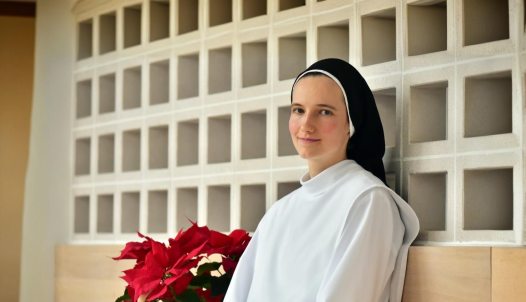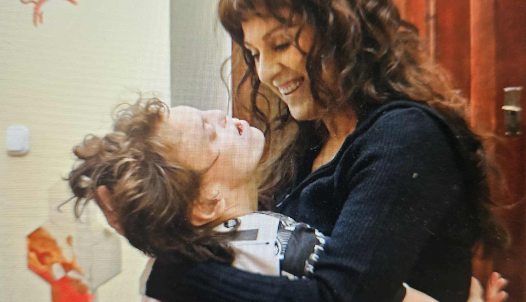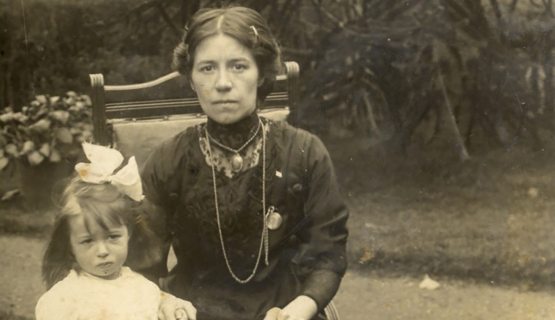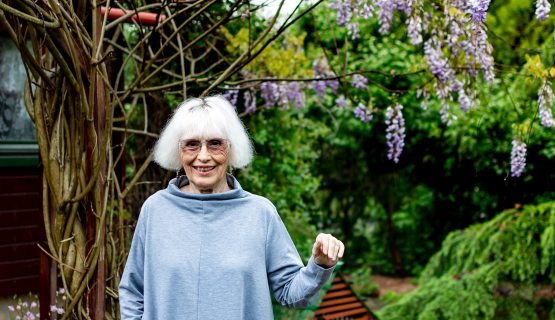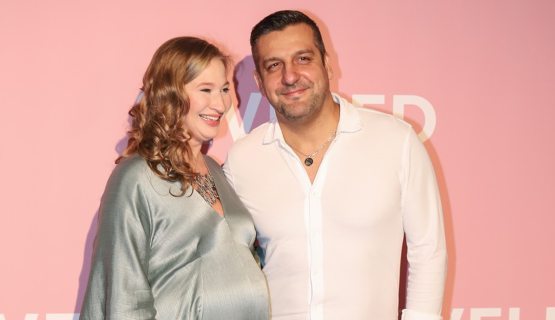“Now is the time to try living my life” – A wheelchair user’s journey toward autonomy
I arrive at a completely new apartment in a completely new residential building — and in a completely new beginning. Emese Rusznák and her assistant, Orsolya Koncz, are not only leading me into this freshly painted living space, but also into a world entirely unfamiliar to me, one with a very different set of coordinates from my own. Emese is a young wheelchair user woman with high support needs, and she is just beginning her journey into a self-determined life in her own home. Yet the organization of autonomous — not independent — living is comparable to running a small business.

Emese is a young writer and blogger, author of the book and audiobook *Mesi-mesék*, and owner of the website *Emese e-meséi* (ed. note: meaning Mesi's tales and Emese's e-tales, both word-plays in Hungarian). Her greatest undertaking, however, is her own life. To live freely and independently, she must build a support network — a small community of around twenty people who help her according to both pre-scheduled and individual arrangements. Some members of this team will be volunteers, others will come from foundations or be paid assistants, and together they must ensure Emese’s daily care, mobility, and space for creativity. Anyone wishing to join her team can apply through her support page, where all conditions are listed.
Emese and Orsolya met in 2013 at the annual youth camp for people with mobility impairments organized by the Maltese Charity Service, and they have been friends ever since.
Within this community, Orsolya is considered a “biped” and her volunteer work is intertwined with their friendship. Both women feel that society still struggles deeply — and therefore tends to treat as taboo — the dignified care and active-life opportunities for people with severe disabilities. Their aim, including by this article, is to stimulate and gently reshape public thinking, even if only on a nano-scale. So that, over time, this topic might transform from “problem” into “challenge,” and from challenge into shared success.
The only chance: building a support network
They have both observed that raising a child with a disability can either bring parents closer together or drive them apart. Often one parent is forced to stay home full-time with the child, while the other does everything possible to provide for the family. The intense lifestyle often ends in divorce. When the family burns out after three or four decades, and the child with a disability becomes an adult, they find themselves in a vacuum.
Large institutions operate with long waiting lists, and the conditions are far from ideal. These facilities are typically designed for chronically ill, elderly, or multiply disabled residents. They usually provide some form of supported employment, but these tasks require minimal creativity — because that’s the type subsidized by the state.
Due to the now extreme shortage of human resources, burnout among workers in the sector is practically constant.
“As long as a child is underage, there is some institutional background behind them. But a person with quadriplegia and full cognitive abilities no longer fits the system as an adult. They are not even eligible for supported housing, because that requires a certain level of independence,” says Emese. “Nursing homes ask for entrance fees in the millions, and then charge monthly fees — while an adult woman in a wheelchair is not an elderly patient and does not belong among the residents.”
“They don’t want to spend their days lying in bed like everyone else in those facilities. They want to get dressed in the morning, work, go to the theater — in other words, live like any typical Képmás.hu reader.”
Both Emese and Orsolya know that the only real chance for a fulfilling life is to organize a support network around an autonomous disabled person. A team large enough to provide all the help required — and with each person taking on only as much as they can do with goodwill.
“Just so I can go to the bathroom three times a day, eat, have meals prepared, and live an active life, I need around eighteen people. My partner has the same disability as I do, and he already has a working support network,” Emese explains.
Help cannot exist only during office hours
Emese suffered a neonatal stroke caused by oxygen deprivation at birth. She lives with conditions commonly seen after a stroke; her twin sibling died from similar injuries on the first day of life. If she can prop her elbow on a table, she can eat from a plate — but she needs assistance with everything else. Her entire future now depends on whether she can gather enough supporters and build the team that will allow her to live independently.
“I’ve been going to the Maltese Charity Service’s camps for young people with mobility impairments for years. Every year I volunteered as an assistant; I love it — it’s close to my heart,” says Orsolya. “My husband is also disabled, and in the last two camps I participated as his assistant. My disabled friends who live alone use detailed weekly schedules — just like Emese. Someone has to assist them three or four times a day, which can be managed by many or few helpers, depending on what each person is willing to take on. At one point, I was the ‘Tuesday evening’ helper for a young man.”
Several municipalities and foundations operate support services, but these function mostly during office hours — because, as the saying goes, “a well-behaved wheelchair user has no needs after 6 p.m. or on weekends.”
The gaps in the system must be filled by friends and acquaintances. This is how something that is an automatic part of daily life for “bipeds” can cost someone else 20,000–25,000 forints per day.
Some countries — those with what Emese calls a “luckier historical development” — provide state support for personal assistance because autonomy includes the right to such help. In Hungary this request has not yet found receptive ears, though the concept exists. Emese believes that supporting personal assistance would also be financially beneficial for the state: people with high support needs could become tax-paying citizens. This requires not only money, but genuine dialogue.
From child role to marriage and poetry
A few years ago, Emese moved out of her mother’s home. Her mother had grown exhausted from years of constant caregiving and isolation — something Emese had to recognize. Like many in similar situations, Emese lived in a “child role” at home, and she, too, needed to leave the nest. With her father’s help, she began to build a new, adult life. The start of autonomy was full of anxiety, but now the apartment is almost ready and the support team is gradually taking shape.
“My husband is also quadriplegic. He had an accident 32 years ago, and over time he built his own support network.
He has a housekeeper, a physical therapist, and sometimes we get external help at night as well. He smartly rented out a room to a hospital nurse at a reduced price, and she can step in during emergencies.
I also do my share — it’s a natural part of our daily life. In the beginning I was one of his ‘built-in’ helpers, and he slowly tested what kind of care tasks I could take on. Every six months we introduced new, more intimate situations. We got married two years ago,” Orsolya says.
Around the time Emese moved out, she saw an elderly wheelchair user woman in a shockingly neglected state. Everyone passed by — and so did she. But the image haunted her, she dreamed about the woman and couldn’t shake the distress. Friends suggested to write down the experience and then throw away the paper. Instead of discarding it, Emese turned the writing into a poster-poem advertising the emergency hotline of the Shelter Foundation. As a writer and blogger, she wanted to preserve the experience in a form that would grab the attention of the passers-by and bring the phone number into focus.
“Luckily, I have a good chance of never ending up like that woman. I’ll always have at least enough money to enter a facility — though I don’t want to. I need to figure out who I really am and what I want to do with my life, because until now I didn’t have the opportunity. What I do know is that community involvement will always be part of my life.”
Emese’s poster-poem is now awaiting a designer, a printer, and volunteers to put it up on the streets.
Emese Rusznák
I should have stopped
I should have stopped —
should have looked past my own ego.
If I had done that, stayed fully present,
I might not only have *noticed*, but *understood*
that the old woman beside me, in her torn wheelchair,
in the dirt of the street, in her own bodily fluids,
was completely helpless.
She may have been there for weeks. Barely conscious —
yet no one seemed to notice. Everyone just walked by.
“Street furniture,” next to the elevator. The crowd rushes past.
Some glance her way,
a few recoil,
muttering as they leave:
“I’ll catch an infection here.
How can they leave her like that?
Somebody should do something.”
Others look, startled —
poor woman, they whisper.
They never imagined such a thing.
They’d never allow this to happen —
but today they’re in a hurry.
And anyway, they don’t know how to help.
They’d probably make things worse.
So — like me — they walk away.
Yes. I did the same.
I became an anonymous part of the crowd.
Since then, I sleep worse.
I look for my own face
but only see hers.
The woman I left behind in the filthy elevator doorway,
abandoned in her own waste.
I rushed off,
telling myself I had something urgent to do.
Maybe she is still standing there.
Surely she is no longer conscious.
Yet sometimes I feel her eyes on me,
asking: “Where are you going?”
What should I have done?
I should have stopped. Just stopped
and dialed a few numbers: +36 1 338 4186 / 1, 104
told them what I saw,
and waited
until a social worker or paramedic —
one of those everyday heroes —
came for her.
If I had stopped,
I could live now with the comfort —
or illusion —
that someone received from me who knows how many extra days,
maybe even a chance
to be noticed,
treated,
and taken somewhere
where she is no longer “street furniture,”
but a tired elderly woman with the right — and the possibility —
to live.
But I didn’t believe in illusions.
and I didn’t have the time.
So I did nothing.
I simply walked away.
And look at me now —
years later,
sitting here, typing this long piece,
barely able to continue,
but forced to — because if I don’t,
I will see her face again.
I feel her eyes on me, asking: “Where are you going?”
If you don’t want to end up like me —
haunted by the faces of those
you didn’t help
because you were “in a hurry” —
then sometimes you just have to stop.
Dial the numbers: +36 1 338 4186 / 1, +36 1 338 4186 / 2, 104 —
and wait for help to arrive.
If you do that, you won’t end up like me.
In fact, you might even save a life.
The English translation of both the article and the poem was produced with artificial intelligence and reviewed by a human editor.


